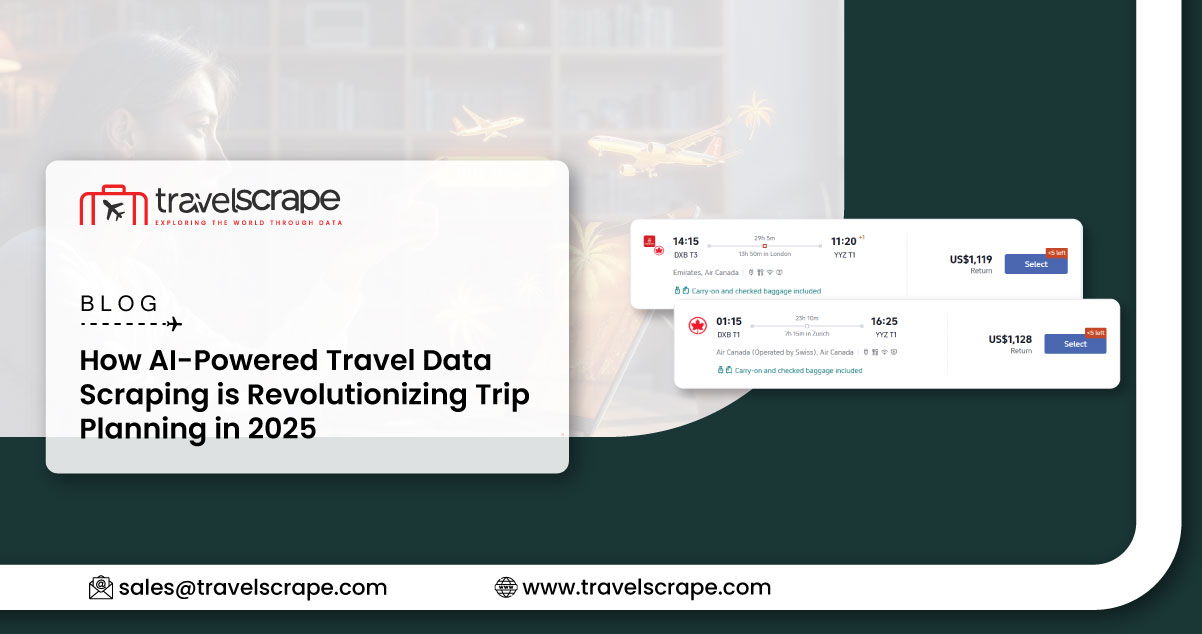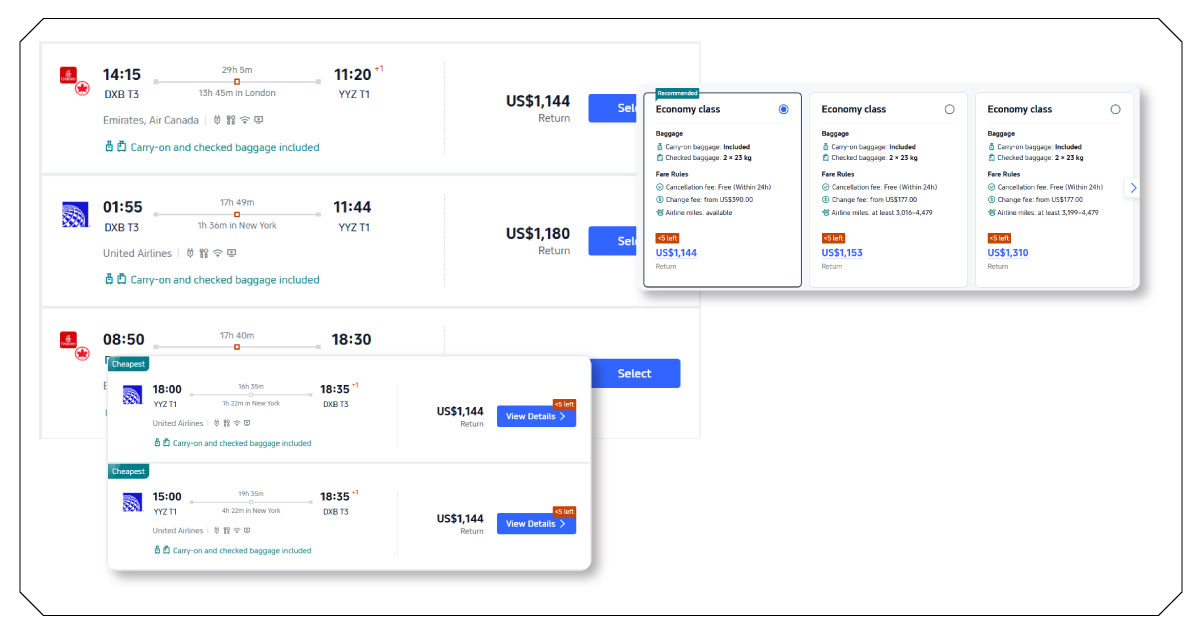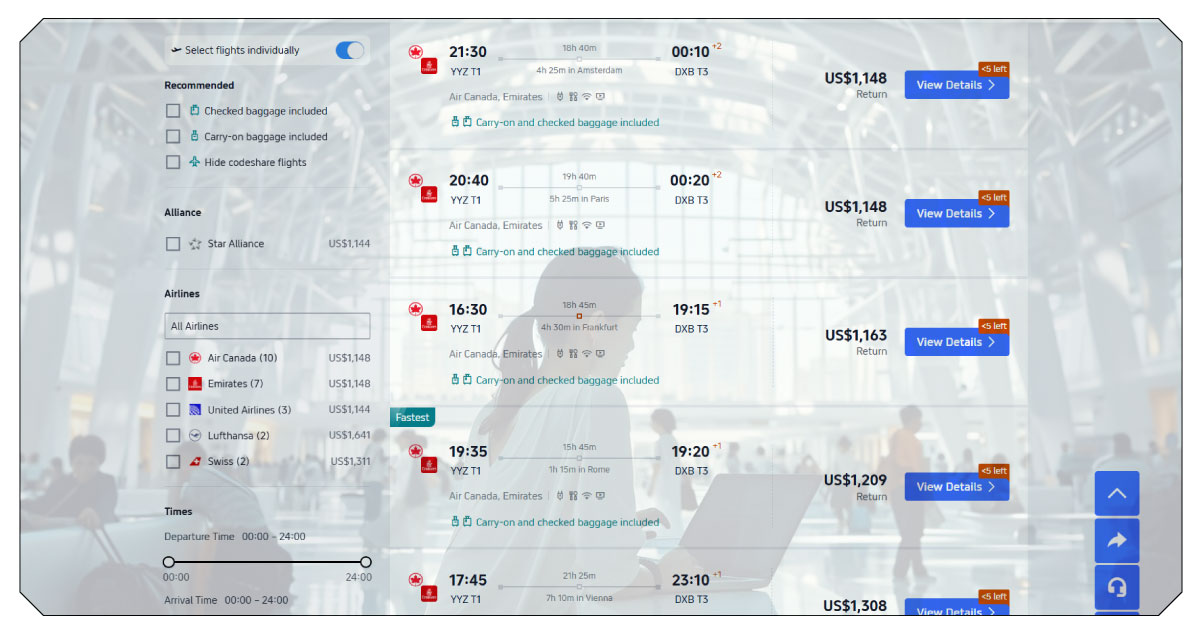How AI-Powered Travel Data Scraping is Revolutionizing Trip Planning in 2025

Introduction
The world of travel is undergoing a radical shift in 2025, moving beyond traditional planning toward innovative, intuitive experiences powered by cutting-edge AI travel planner 2025 technology. Static itineraries or generic recommendations no longer bind travelers. Instead, AI-Powered Travel Data Scraping is revolutionizing how journeys are crafted, using real-time insights and preferences to deliver hyper-personalized adventures. This transformation's core is travel data scraping, which allows AI systems to collect and process massive volumes of information from flight databases, hotel platforms, local events, and user reviews. The AI travel planner 2025 doesn't just streamline logistics—it anticipates needs, understands traveler behavior, and creates dynamic travel solutions that adapt as plans evolve. Whether exploring hidden gems or organizing a multi-country itinerary, this new era of AI-powered trip planning ensures a seamless and intelligent experience, bringing convenience, personalization, and excitement to every travel journey.
The Evolution of Trip Planning

Gone are the days of flipping through travel guides or spending hours browsing websites to piece together the perfect itinerary. Today, platforms can scrape travel websites to gather comprehensive data from flights, hotels, attractions, and reviews in seconds. These systems analyze millions of data points to present travelers with options that align with their preferences, budgets, and schedules. Imagine planning a week-long trip to Paris with just a few clicks, as AI pulls together flight deals, hotel availability, and even local restaurant recommendations tailored to your taste.
The beauty of trip planning tools 2025 lies in their ability to streamline the process. These tools don’t just collect data; they interpret it, learning from user inputs and global travel trends to offer suggestions that feel almost psychic. Whether you’re a solo backpacker or planning a family vacation, these platforms adapt to your needs, making travel planning less about logistics and more about excitement.
How AI Transforms Travel Data into Insights?
At the core of this transformation are travel AI tools, which use sophisticated algorithms to process data scraped from various sources. These tools can extract travel itinerary data from booking platforms, social media, and travel blogs, creating a holistic view of what’s available. For example, an AI might analyze flight prices across multiple airlines, cross-reference them with hotel deals, and even factor in local events to suggest the best time to visit a destination.
This process, known as smart travel scraping, goes beyond basic data collection. It involves understanding context—such as seasonal price fluctuations or traveler reviews—to provide practical and inspiring recommendations. By compiling this information, AI ensures that every aspect of your trip, from transportation to activities, is optimized for value and enjoyment.
Personalization at Its Best
One of the standout features of data scraping for trip planning is its ability to deliver hyper-personalized experiences. An AI travel assistant doesn’t just throw generic suggestions at you; it learns from your past trips, preferences, and even social media activity to craft a journey that feels uniquely yours. Love adventure sports? The AI might recommend a hiking trip in the Alps with specific trails based on your fitness level. Prefer cultural immersion? It could suggest a curated list of museums, local festivals, and hidden gems in Kyoto.
This customization level is possible because AI can scrape travel app data from platforms like Airbnb, TripAdvisor, or Google Maps. The AI identifies trends and preferences that align with your travel style by analyzing user-generated content, such as reviews and ratings. It’s like having a personal travel agent who knows you better than you know yourself.
The Role of AI in the Travel Industry

The integration of AI in travel industry is not just about convenience; it’s about creating smarter, more informed decisions. For instance, AI can automate travel planning by handling repetitive tasks like comparing flight prices or checking visa requirements. This automation frees up time for travelers to focus on the fun parts of planning, like choosing activities or dreaming about their destination.
Moreover, AI-driven travel experiences are reshaping how we interact with travel platforms. AI-powered chatbots can answer questions in real time, offering advice on everything from packing tips to local customs. These systems are constantly updated with real-time travel data, ensuring you have the most current information, whether it's a last-minute flight deal or a weather update for your destination.
The Power of Specialized Scraping Services
Specialized services like Travel Web Scraping Service play a crucial role in fueling these intelligent systems. These services are designed to collect data from various sources, including airline websites, hotel booking platforms, and travel forums. By aggregating this data, they provide the raw material that AI systems need to generate actionable insights.
Similarly, a Travel Scraping API allows developers to integrate travel data into their applications, enabling seamless access to flight schedules, hotel availability, and more. This technology empowers travel companies to offer dynamic pricing and real-time updates, ensuring travelers can always access the best deals.
For example, Airlines Data Scraping enables AI systems to monitor fare changes across multiple carriers, helping travelers snag the lowest prices. By analyzing historical data and current trends, these systems can even predict when prices are likely to drop, giving you a strategic edge in booking your flights.
Enhancing the Traveler’s Experience
The impact of AI-powered scraping extends beyond logistics to the essence of travel: the experience. By pulling data from diverse sources, AI can suggest off-the-beaten-path destinations or unique activities that align with your interests. For instance, it might recommend a lesser-known beach in Thailand based on glowing reviews scraped from travel blogs or suggest a cooking class in Italy after analyzing local event listings.
These recommendations are not random; they result from AI’s ability to process vast amounts of data and identify patterns humans might miss. This means travelers can discover hidden gems without spending hours researching, making every trip feel like a bespoke adventure.
The Future of Travel Planning

As we move further into 2025, the role of AI in travel is only set to grow. With AI systems learning to anticipate traveler needs with uncanny accuracy, the ability to scrape travel websites and apps will become even more sophisticated. Imagine a future where your AI travel assistant plans your itinerary and adjusts it on the fly based on real-time factors like flight delays or sudden weather changes.
The rise of trip-planning tools in 2025 also means that travel will become more accessible. By automating complex tasks and providing clear, data-driven recommendations, these tools empower everyone—from seasoned globetrotters to first-time travelers—to confidently plan trips. Whether booking a weekend getaway or a multi-country expedition, AI ensures the process is smooth and stress-free.
Real-World Applications
Consider a scenario where you’re planning a trip to New York City. An AI travel assistant could scrape data from airline websites to find the cheapest flights, analyze hotel reviews to recommend a stay centrally, and even suggest Broadway shows based on your interest in theater. If you’re traveling on a budget, the AI might prioritize free attractions or affordable dining options while factoring in real-time data like subway schedules or event cancellations.
For businesses, AI in travel industry applications is equally transformative. Travel agencies can use scraped data to offer tailored packages, while airlines and hotels can leverage insights to optimize pricing and improve customer satisfaction. The result is a win-win: travelers get better experiences, and businesses gain a competitive edge.
The Global Impact
On a broader scale, AI-driven travel experiences are making travel more inclusive and sustainable. By analyzing data on travel patterns, AI can suggest less crowded destinations, helping to reduce overtourism. It can also recommend eco-friendly options, like carbon-neutral flights or sustainable accommodations, aligning with the growing demand for responsible travel.
Moreover, the ability to scrape travel app data ensures that travelers can access information in their native language, breaking down barriers for international exploration. Whether navigating a new city or planning a cross-continental journey, AI makes the world feel smaller and more connected.
How Travel Scrape Can Help You?
- Live Monitoring of Travel Platforms: We continuously scrape data from airline sites, hotel booking platforms, and transportation services to capture real-time availability, delays, and price fluctuations.
- Geo-Specific Event Tracking: Our tools extract up-to-date information about local events, festivals, and regional happenings to align trip plans with dynamic cultural experiences.
- Personalized Data Filters: We tailor scraping parameters based on traveler profiles—budget, preferences, and travel history—so the data only reflects relevant and timely options.
- Instant Pricing Updates: Our custom scrapers instantly detect and report price drops, flash deals, or surge pricing, ensuring travelers make cost-effective decisions.
- Weather and Safety Alerts Integration: We integrate weather and safety data into scraping feeds, allowing real-time itinerary adjustments based on climate disruptions or local advisories.
Conclusion
As we embrace 2025, AI-powered trip planning is ushering in a new era of smarter, more personalized, and endlessly exciting travel. With tools like Hotel Data Scraping, travelers can access real-time information on accommodations, ensuring they find the perfect place to stay at the best price. Similarly, Vacation Rental Pricing Data 2025 empowers users to compare options across platforms like Airbnb and Vrbo, securing deals that fit their budget. And with Travel Aggregators Scraping, AI systems can pull together the best offers from multiple sources, creating cost-effective and unforgettable itineraries.
In this brave new world of travel, AI-Powered Travel Data Scraping is more than a tool—it’s a gateway to experiences that are tailored, efficient, and inspiring. Whether you dream of a tropical escape or a cultural odyssey, AI is here to make your journey as remarkable as the destination. So, pack your bags and let AI take the wheel—your next adventure is just a few clicks away.
Ready to elevate your travel business with cutting-edge data insights? Get in touch with Travel Scrape today to explore how our end-to-end data solutions can uncover new revenue streams, enhance your offerings, and strengthen your competitive edge in the travel market.